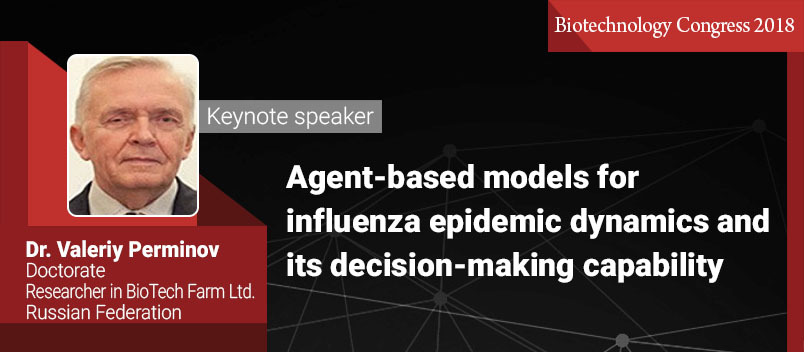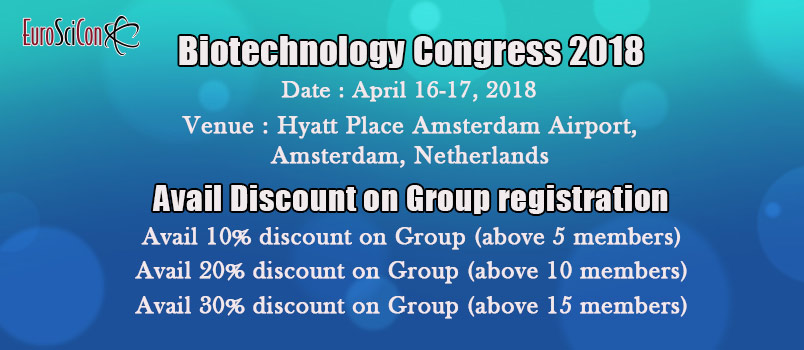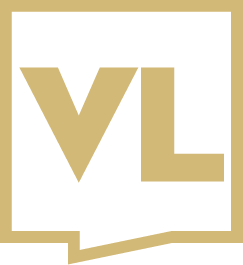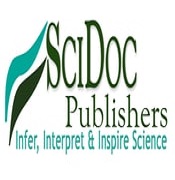Biotechnology Congress 2018
ABOUT CONFERENCE
On behalf of Biotechnology Congress 2018 Organizing Committee, we are pleased to invite all Biotechnologists, Professors, Researchers, scientists, Business Giants, CEOs, COOs, Directors, Vice Presidents, Co-directors, Managing Directors, Industry Safety Officers, Environmental & Plant Scientists, Post Doctorate Fellows, Vendors of Consumer Products/ Managers, Pharmaceutical Scientists, Students from the Biotechnology and its allied areas.
The conference proceedings include symposiums and workshops, keynote speeches, plenary talks, poster sessions and panel discussion on latest research developments in the field of Biotechnology.
EuroSciCon is the longest running independent life science events company with a predominantly academic client base. Our multi professional and multi-speciality approach creates a unique experience that cannot be found with a specialist society or commercially.
Euroscicon are corporate members of the following organisations:
Royal Society of Biology
IBMS
British Society for Immunology
Rare Care UK
Conference Topics:
Industrial Biotechnology
Genetic Engineering and rDNA Technology
Microbial Biotechnology
Medical Biotechnology
Advancements in Biotechnology
Nanobiotechnology
Pharmaceutical Biotechnology
Bioengineering and Biotechnology
Bioproducts and Bio Energy
Reproductive Biotechnology
Plant and Agriculture Biotechnology
Environmental Biotechnology
Bioremediation and Biodegradation
Biomass and Bioenergy
Biotechnology and Bioprocess Engineering
Opportunities for Conference Attendees:
For Researchers & Faculty:
Speaker Presentations
Poster Display
Symposium hosting
Workshop organizing
For Universities, Associations & Societies:
Association Partnering
Collaboration proposals
Academic Partnering
Group Participation
For Students & Research Scholars:
Poster Competition (Winner will get Best Poster Award)
Young Researcher Forum (YRF Award to the best presenter)
Student Attendee
Group registrations
For Business Delegates:
Speaker Presentations
Symposium hosting
Book Launch event
Networking opportunities
Audience participation
For Companies:
Exhibitor and Vendor booths
Sponsorships opportunities
Product launch
Workshop organizing
Scientific Partnering
Marketing and Networking with clients
Sessions/ Tracks
Industrial Biotechnology: Industrial or white biotechnology uses enzymes and micro-organisms to make bio based products in sectors such as chemicals, food and feed, detergents, paper and pulp, textiles and bioenergy. The application of industrial biotechnology has been proven to make significant contributions towards mitigating the impacts of climate change in these and other sectors. In addition to environmental benefits, biotechnology can improve industry’s performance and product value and, as the technology develops and matures, white biotechnology will yield more and more viable solutions for our environment. These innovative solutions bring added benefits for both our climate and our economy.
Microbial Biotechnology: For thousands of years, microorganisms have been used to supply products such as bread, beer and wine. A second phase of traditional microbial biotechnology began during World War I and resulted in the development of the acetone-butanol and glycerol fermentations, followed by processes yielding, for example, citric acid, vitamins and antibiotics. In the early 1970s, traditional industrial microbiology was merged with molecular biology to yield more than 40 biopharmaceutical products, such as erythropoietin, human growth hormone and interferon. Today, microbiology is a major participant in global industry, especially in the pharmaceutical, food and chemical industries.
Genetic Engineering and r DNA Technology: Genetic engineering is the manipulation of an organism's genome using biotechnology Principles. It is a set of technologies used to change the genetic makeup of cells, including the transfer of genes within and across species domains for the production of improved or novel organisms. Genetic engineering has applications in medicine, research, industry and agriculture and can be used on a wide range of plants, animals and microorganisms. Tissue engineering is the use of a integration of cells, engineering and materials principles, and suitable biochemical and physicochemical factors to improve or replace biological tissues.
Medical Biotechnology: Biotechnology in medical or health care represents the complex of modern biological approaches in the field of healthcare research and industry. Medical Biotechnology methods are used primarily in pharmaceutical industry and modern clinical diagnostics. For the first time in the history of human Medical biotechnology is enabling the development and manufacturing of therapies for a number of rare diseases with a genetic origin. Although individually rare, collectively these diseases affect some 20-30 million individuals and their families with 70-80% having a genetic component requiring biotechnology as part of the solution.
Advancements in Biotechnology: Biotechnology as the name indicates that based on technology the progression of biology. Nowadays the whole world relies on technologies, into that where biology is our Base of life, & when scientists are using technology in biology it is doing wonders. Biotechnology can be used in several fields and sectors. For example in medical therapy, in war-fields (Bio--weapons), In agricultural biology, in reproductive biology, in cell biology, in genetic engineering. There is endless ways in which biotechnology is being used. It is a great combination which actually has the ability to change the impossible into possible.
Pharmaceutical Biotechnology: Pharmaceutical biotechnology is a comparatively new and growing field in which the principles of biotechnology are applied to the designing and production of drugs. Pharmaceutical companies manufacture and market drugs, livestock feed supplements, vitamins, and a host of other products. Consistently, Pharmaceutical companies are one of the most profitable industries in the U.S. with sales exceeding $320 billion per year.
Bioengineering: Bioengineering as a defined field is relatively new, although attempts to solve biological problems have persisted throughout history. Recently, the practice of bioengineering has expanded beyond large-scale efforts like prosthetics and hospital equipment to include engineering at the molecular and cellular level – with applications in energy and the environment as well as healthcare. A very broad area of study, bioengineering can include elements of electrical and mechanical engineering, computer science, materials, chemistry and biology. This breadth allows students and faculty to specialize in their areas of interest and collaborate widely with researchers in allied fields.
Bio-Products and Bio-Energy: Bioenergy is renewable energy made available from materials derived from biological sources. Biomass is any organic material which has stored sunlight in the form of chemical energy. As a fuel it may include wood, wood waste, straw, manure, sugarcane etc. Bio-products are the application of plant-derived resources as an alternative to non-renewable matter. This sustainable approach considers the entire product life cycle from its agricultural origin to its overall renewability. Bio based innovation in the production and content of commonly used items assures consumers of improved environmental well-being without compromising product performance.
Reproductive Biotechnology: Reproductive Biotechnology encompasses all current and anticipated uses of technology in human and animal reproduction, including assisted reproductive technology, contraception and others. Efficient reproductive performance and monitoring are imperative for sustainability in any livestock production system, especially for milk, meat, draft, and replacement animals. In recent times, there has been increasing challenges for increasing productivity and disease with altering climate. These targets, thought to some extent, can be achieved by conventional reproduction techniques. Advent and use of modern reproductive technologies have opened many avenues to study, treat and manipulate the reproductive phenomenon both in vitro and in vivo to improve reproductive performance in various domestic species of livestock.
Plant and Agriculture Biotechnology: Agricultural biotechnology is the area of biotechnology involving applications to agriculture. Agricultural biotechnology has been practiced for a long time, as people have sought to improve agriculturally important organisms by selection and breeding. An example of traditional agricultural biotechnology is the development of disease-resistant wheat varieties by cross-breeding different wheat types until the desired disease resistance was present in a resulting new variety. Modern agricultural biotechnology improves crops in more targeted ways. The best known technique is genetic modification, but the term agricultural biotechnology (or green biotechnology) also covers such techniques as Marker Assisted Breeding, which increases the effectiveness of conventional breeding. Whatever the particular technology used, the crops may be destined for use for food, biomaterials or energy production. Genetic modification means that existing genes are modified or new genes included to give plant varieties desirable characteristics, such as resistance to certain pests or herbicides, or for vitamin fortification. Because only a few genes with known traits are transferred, GM methods are more targeted and faster than traditional breeding. Biotechnology has helped to increase crop productivity by introducing such qualities as disease resistance and increased drought tolerance to the crops. Plant biotechnology is the technique used to manipulate the plants for specific needs or requirement. In traditional process seed is the major source for germinating a new plant but the advance method is independent that combines multiple needs to get the required traits.
Environmental Biotechnology: Environmental biotechnology is biotechnology that is applied to and used to study the natural environment. Environmental biotechnology could also imply that one try to harness biological process for commercial uses and exploitation. The International Society for Environmental Biotechnology defines environmental biotechnology as "the development, use and regulation of biological systems for remediation of contaminated environments (land, air, water), and for environment-friendly processes.
Bioremediation and Biodegradation: Bioremediation is a term used in biotechnology which is helping in cleaning the environment. It’s a process in which the microorganisms or their enzymes are used to clean up environment which is contaminated. With the help of microorganisms certain compounds that are contaminating the environment are degraded.it is one of the solutions that are used to reduce the pollution. There are 2 types of bioremediation. In Biodegredation organic compounds are degraded or broken down with the help of microorganisms. The organic compound that is degraded is usually the animal and plant waste which is converted into certain elements that are returned to the environment and are used again usually by plants. The artificial compounds may also be bio degraded but these compounds must resemble the animal or plant waste or organic compounds. With the help of this biodegradation the elements or the nutrients are returned to the environment. It is a very important process. Usually the materials like certain plastics are manufactured focusing on the aspect that it should be biodegradable which can be degraded easily into simpler compounds. Biomass is an industry term for getting energy by burning wood, and other organic matter. Burning biomass releases carbon emissions, around a quarter higher than burning coal, but has been classed as a "renewable" energy source in the EU and UN legal frameworks, because plants can be regrown. Bioenergy is renewable energy made available from materials derived from biological sources. Biomass is any organic material which has stored sunlight in the form of chemical energy.
Biomass and Bioenergy: Biomass is an industry term for getting energy by burning wood, and other organic matter. Burning biomass releases carbon emissions, around a quarter higher than burning coal, but has been classed as a "renewable" energy source in the EU and UN legal frameworks, because plants can be regrown. Bioenergy is renewable energy made available from materials derived from biological sources. Biomass is any organic material which has stored sunlight in the form of chemical energy.
Biotechnology and Bioprocess Engineering: Biochemical manufacturing and bio separations have made it possible to purify products derived from biotechnology on a large scale Biotechnology is defined by the tools used to practice it. By programming DNA and directing cellular machinery, we can obtain products that were unimaginable even 10 years ago. With biotechnology, we can direct the Nano scale machinery of living cells to produce self-contained factories that perform on a characteristic scale of one micron. To be useful to people, however, bio products and bioenergy must be produced in immense quantities. Genetic engineering, for example, is carried out at a molecular scale but is amplified through bioprocess engineering to transfer the technology from the test tube to the bottle through a sequence of integrated steps that generate, recover, purify and package the product (NRC, 1992). The challenge facing bioengineers is to redirect genetic and cellular machinery to make economically important molecules when the cells are placed in controlled environments. Engineers must design, build, and operate hardware and integrated systems that can multiply a cell’s output by a factor of one trillion, as well as recover and purify the products in a cost-effective manner. Bioprocess engineering is the next frontier.
Learn More
Top Biotechnology Universities Worldwide:
Biotechnology Universities in Europe
University of Oxford || University of Cambridge || University College London || Swiss Federal Institute of Technology Zurich || University of Edinburgh || Imperial College London || University of Manchester || Utrecht University || École Polytechnique Fédérale de Lausanne || Catholic University of Leuven || University of Amsterdam || King's College London || University of Copenhagen || University of Groningen || University of Helsinki || Ludwig Maximilians Universität München || University of Glasgow || University of Oslo || University of Leeds || Ghent University
Biotechnology Universities in USA
Harvard University || Stanford University || Massachusetts Institute of Technology || University of California Berkeley || University of Michigan || University of Washington || Cornell University || Columbia University New York || University of California Los Angeles UCLA || University of Pennsylvania || Yale University || Johns Hopkins University || University of Wisconsin Madison || University of California San Diego || Pennsylvania State University || Duke University || University of Texas Austin || University of Chicago || Princeton University || New York University || University of North Carolina Chapel Hill || University of Illinois Urbana Champaign || University of Southern California || University of Florida || University of California Davis || Northwestern University || University of Maryland College Park || Ohio State University || Carnegie Mellon University || University of California Irvine || Michigan State University || Washington University Saint Louis || University of Pittsburgh || California Institute of Technology Caltech || Purdue University || Boston University || University of California San Francisco || Rutgers The State University of New Jersey || University of Arizona || Georgia Institute of Technology
Biotechnology Universities in Asia
University of Tokyo || Tsinghua University || Peking University || National University of Singapore || Kyoto University || Zhejiang University (National Che Kiang University) || Seoul National University || National Taiwan University || Shanghai Jiao Tong University || University of Hong Kong || Fudan University (Shanghai Medical University) || University of Science & Technology of China || Nanyang Technological University || Shandong University || Chinese University of Hong Kong || Nanjing University || Tongji University || Osaka University || Tel Aviv University || Korea Advanced Institute of Science & Technology KAIST ||
International Biotechnology Journals
Supported Journals of USA
Journal of Biotechnology || Electronic Journal of Biotechnology || Nature Biotechnology || Trends in Biotechnology || Current Opinion in Biotechnology || Plant Biotechnology Journal || Biotechnology Advances || Trends in Food Science and Technology || Biotechnology for Biofuels || Bioconjugate Chemistry || Molecular Nutrition and Food Research || Food Control || Biotechnology and Bioengineering || Biomedical Optics Express || Journal of Biomolecular Screening || Computational and Structural Biotechnology Journal
Supported Journals of Europe
Applied Microbiology and Biotechnology || New Biotechnology || Marine Biotechnology || Journal of Biotechnology || Journal of Industrial Microbiology and Biotechnology || Biochemical Engineering Journal || BMC Biotechnology || Journal of Animal Science and Biotechnology || Yeast || Journal of Applied Microbiology || Biological Cybernetics || Journal of Bioscience and Bioengineering || Cellular Reprogramming || Biotechnology Progress || Biotechnology Reports || Current Pharmaceutical Biotechnology || World Journal of Microbiology and Biotechnology || Biotechnology and Genetic Engineering Reviews ||
Supported Journals of Asia
Plant Biotechnology Reports || Applied Biochemistry and Biotechnology || Journal of Microbiology and Biotechnology || Plant Biotechnology || Bioscience, Biotechnology and Biochemistry || Crop Breeding and Applied Biotechnology || Journal of Plant Biochemistry and Biotechnology || Biotechnology and Bioprocess Engineering || Preparative Biochemistry and Biotechnology || Food Science and Biotechnology || Journal of Microbial and Biochemical Technology || Horticulture Environment and Biotechnology || Food Science and Technology || Recent Patents on Biotechnology || Animal Biotechnology || Applied Bionics and Biomechanics || International Journal of Food Engineering || Journal of Healthcare Engineering || Food Biotechnology || Health and Technology
BiotechnologyJob Opportunities in USA
Forensic DNA Analyst || Crime Lab Technician || Quality Control Analyst || Quality Control Engineer || Biotechnology Laboratory Technician || Biotechnology Research Associate || Assistant Professor of Food Biotechnology || Exciting PhD Positions in Modern Biology || Postdoctoral Researchers - Rapid Identification of Auto-Antigens in Autoimmune Diseases || Principal Investigator || Postdoc position in the area of Microbial Evolution and Cell Factory Engineering || PhD positions Single-molecule protein sequencing and analysis with nanopores || Operational Director Biotechnologies & Compound Screening || Analyst || Analytical Lab Technician || Analytical Services Chemist || Assay Development Specialist || Assistant Field Technician || Assistant Technician || Associate Professor || Bioanalytical Scientist || Biochemist || Bioinformatics Research Scientist || Biology Professor || Business Analyst || Business System Analyst || Cell Biology Scientist || Clinical Research Associate || Bioinformatics Specialist || Animal Caretaker || Production Engineer || Qualiy Assurance (QA) Engineer || Consultant || Discovery Research || Lab Assistant || Clinical Development || Document Assistant || Research Associate || Senior Research Associate || Scientist || Senior Scientist || Research Director || Data Associate || Biostatistician || Research Associate || Medical Writer || Medical Expert || Medical Director || Regulatory Affairs || Document Specialist Regulatory || Associate Labeling Associate || Dossier Management Associate || Director Regulatory Affairs || Specialist Quality Assurance ||
Biotechnology Job Opportunities in EUROPE
Document Specialist Quality Assurance || Associate Quality Assurance || Auditor Quality Assurance Engineer Validation || Associate Validation Specialist || Quality Assurance Director || Process Development || Assistant Process Development || Associate Process Development || Process Development Scientist || Process Development Engineer || Process Development Director || Engineer Health and Safety || Biochemist Quality control || Microbiologist Quality control || Cell Biologist Quality control || Chemist Quality control || Marine Biotechnology || Industrial Biotechnology || Medical Biotechnology || Pharmaceutical Biotechnology || Biotechnology, Bioprocessing and Business Management || Food & Beverage Management Trainee || Culinary/Food & Beverage || Medical Specialist || Healthcare Nursing || Quality control Director || Cell Line Development Manager || Chemical Engineer || Chemical Technician || Climate Data Analyst || Clinical Data Research || Clinical Pharmacology Professor || Clinical Pharmacy Assistant || Clinical Research Coordinator || Clinical Research Director || Compliance Technician || Computational Chemistry Manager || Computer Programmer || Computing Consultant || Conservation Technician || Development Technologist || Drug Evaluator || Drug Regulatory Affairs Manager || Environmental Data Analyst || Environmental Emergencies Assistant || Environmental Emergencies Planner || Environmental Health Scientist || Environmental Project Analyst || Environmental Research Assistant || Environmental Scientist || Environmental Services Representative || Environmental Specialist || Exploration Director || Field Applications Specialist || Field Technician || Financial Analyst || Forensic Chemist || Forensic Scientist || Gene Editing Manager || Genetic Counselor || Grants/Proposal Writer || Groundwater Technician || Hardware Designer || Health Research Assistant || Health Technology Assistant || || Hospital Research Assistant || Immunology Scientist
Biotechnology Job Opportunities in Asia
Medical Communications Director || Medical Physics Researcher || Medical Research Assistant || Medical Research Technician || Medical Scientist || Molecular Biologist || Molecular Scientist || Oncology Researcher || Organic Lab Research Assistant || Pharmaceutical Assistant || Process Inspector || Process Research Manager || Stem Cell Researcher || STEM Career Advisor || Structural Biologist || Structural Engineer || Technology Research Manager || Technology Specialist || Therapeutic Director || Toxicologist || Public Health Specialist || Quality Assistant || Quality Assurance Manager || Quality Assurance Technologist || Quality Control Manager || Quality Control Supervisor || Regulatory Affairs Associate || Regulatory Affairs Director || Regulatory Officer || Rehabilitation Engineering Assistant || Reimbursement Analyst || Research Assistant || Research Chemist || Research Team Leader || Research Technician || Research and Development Associate || Research and Development Chemist || Research and Development Technician || Research and Development Tester || Research Scientist || Researcher || Safety Data Specialist
Biotechnology Societies and Association
Biotechnology Association in Europe :
European Biotechnology Network || EuropaBio European Association for Bioindustries || Drug Information Association (DIA) || Biotechnologie-Industrie-Organisation Deutschland || SBA Swiss Biotech Association || MedTech Europe || Medicines for Europe || ASEBIO Association of then Spanish Biotech Enterprises || Life Science Austria (LISA) || NIABA Netherland's Biotechnology Association || IBIA Irish BioIndustry Association || HBA Hungarian Biotechnology Association || France Biotech || Finnish Bioindustries || European Biopharmaceutical Enterprises || DANISH Association of Biotechnology Industries || CEBR Council of European Bioregions || SwedenBIO || Bio.be Belgian Biotechnology Industry Organisation || ASSOBIOTEC Italian Association for the Development of Biotechnology || Portugal's Biotechnology Industry Organization || Norwegian Bioindustry Association || Acambis || Protherics || Antisoma || Cambridge Antibody Technology || Vernalis || ML Laboratories || Xenova || BioIndustry Association || ImClone Systems
Biotechnology Association in USA:
National Institutes of Health || National Science Foundation || PEW Initiative on Food and Biotechnology || PEW Initiative on Food and Biotechnology || Pharmaceutical Research & Manufactures of America || U.S. Department of Agriculture || Biotech Companies Mexico || iBIO - Illinois Biotechnology Innovation Organization || IBA- The official website of Iowa Biotechnology Association || Biotechnology - American Chemical Society || Society for Applied Biotechnology || Society for Industrial Microbiology and Biotechnology (SIMB)Society || Massachusetts Biotechnology Council || Virginia Bio || Oregon Bioscience Association || The American Society for Biochemistry and Molecular Biology || Michigan Tech Researchers || Biocom Life Science Association of California || BIO Biotechnology Innovation Organization || USA Life Sciences || NewYorkBio || BioIndustry Association || The Pennsylvania Biotechnology Association || California Life Sciences Association || USW: Biotechnology - US Wheat Associates || Bio Nebraska || AusBiotech || Biogen Idec || MedImmune.
Biotechnology Association in Asia :
Chinese Biopharmaceutical Association || BioIndustry Association || THE BIOTECH RESEARCH SOCIETY || BioCentury || BioHouston || Biotechnology Industry Organization || Food and Drug Administration || Association of Biotechnology Led Enterprises || National Health Council || pfizer || Asian Federation of Biotechnology || BioAsia || Asia Reproductive Biotechnology Society || South Asia Biotechnology Centre || Genencor International || Organization - CropLife Asia || Life Science Pharma Biotechnology || Neurocrine Biosciences || InterMune || Bioniche Life Sciences || ZymoGenetics || International Service for Acquisition of Agri-Biotech Applications || National Biodiesel Board























